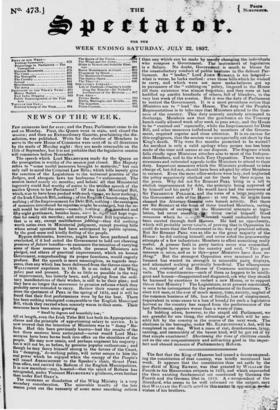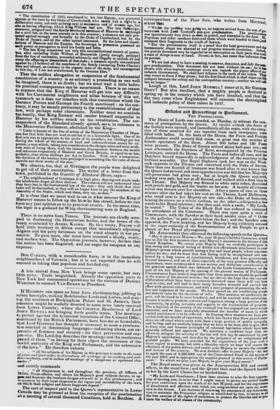The fact that the King of Hanover had issued a
decree suspend- ing the constitution of that country, was briefly mentioned last week. It appears that the constitution thus set aside by the ipse dixit of King ERNEST, was that granted by WILLIAM the Fourth to his Hanoverian snbjects in 1833, and which superseded the then existing fundamental act sanctioned by GEORGE the Fourth and the German Diet in 1919. A c irrespondent of the Standard, who seems to be well informed on the subject, says that WILLIAM the Fourth acted in this matter in opp3siti5p.-44rsite
wishes of his brothers. ,1.4"
" The constitution of 1833, sanctioned by his late Majesty, was protested • correspondent of the True Sun, who writes from Montreal, against at the time by the Duke of Cumberland, who Rarely had a right"to a i states float deliberative voice, not only as being next in succession and of mantes: age, but : also as having offspring, which Kilter William had not. The late .Soetereign, t " While% the meeting was going on, an express arrived from the seat of pea.
moreover, assigned over the family territorial revenues of Hanover in *change i
for a civil list, in the same manner as in this country ; a measure not only pro. was ignominiously torn down as mon as posted, and trampled in the dust. M. tested against strongly and formally by the Duke of Cumberland, but by the Papineau and other speakers destroyed those which were handed to them:ALA Duke of Sussex, and all the other annati interested. By the laws and consti- scattered their fragments to the winds of heaven.
Stations of Hanover and the Empire, the Sovereign in possession possessed no " But the proclamation itself is a proof that the local government and the
such power or prerogative to bind his family and heirs. bureaucratic clique are alarmed at our progress towards revolution. Indeed, " The late King committed not only this unconstitutional stretch of power, the puerile document may be regarded as an Resumption on their parts that such but, after excluchug Duke William of Brunswick (justly, enough, perhaps) a state of things is near at hand. No one, in fact, can resist that inference from from the line of succession, proceeded arbitrarily and illegally to exclude all and its perusal.
every the offspring or descendants of that duke ; a measure equally remonstrated " We are just about to have a meeting to answer, denounce, and defy the pep, against by (1 believe) all the members of the family (excepting Duke Charles) gun proclamation. This document has not been without its use; for it his here and abroad, as contrary to the organic laws of the state, and unrecognized shown with what supreme contempt every one regards the pigmy effort of our
to this day, if I am not misinformed, by the German Diet." imbecile Government. We shall hurl dehance in the teeth of our rulers. They may resort to force if they please; but the first blood which is shed wipes out the That the sudden abrogation or suspension of the fundamental compact between the colony and the metropolitan country—mother we will Clii constitution of a country is as arbitrary a proceeding as can well her no longer."
be imagined, there is no doubt ; but we must wait a little before Laugh at this, Lord Joss: RUSSELL ! sneer at it, Sir GEORGE its practical consequences can be ascertained. There is no reason GREY! But also recollect, that a mighty people is destined to to suppose that the King of Hanover will get into any difficulty spring up in the country which you have insulted, and that the with his Continental neighbours and allies because of this act, day may come when Englishmen will execrate the shortsighted inasmuch as it does not interfere with that constitution which the and imbecile policy of their rulers in 1837. German Powers and GEORGE the Fourth sanctioned : on the con-
trary, it may be merely preliminary to the reestablishment of that !Debater; anti Vrateetringi in tlatliament.
law, with perhaps some alterations. Neither must we conclude too hastily, that King ERNEST will render himself unpopular in Hanover by his sudden attack on the constitution. The cor-
respondent of the Standard already quoted, says, in reference to the Gallery were opened ; and immediately all the seats, with the excep.
the Hanoverian Parliament, abolished by the King— tion of those reserved for one reporter from each newspaper, were " Little is known of the line of action of the Hanoverian Chamber of Depu- filled with ladies. In the body of the House, the Peers and Foreign ties, hut that little does not tend to exhibit it in a favourable light. One of its Ambassadors could scarcely find room, so great was the number of first acts was to appropriate to the profit of its members, ten shillings per day female spectators of the show. About 300 ladies and 130 Peens during the whole of the session, as head and indemnification money for ex- were present. The Duke of Sussex arrived about half-past one ; and penses ; a sum which, taking into consideration the cheaper rates and more mode- rate style of living there, with the immense disproportion between the wealth soon afterwards the Dutchess of Kent, accompanied by the Princess and resources respectively of Hanover and Great Britain, is equal to no less, Leiningen, entered the House. The Peers and ladies all rose, and the probably, than thirty shillings per day in Loudon. With such a temptation, Dutchess bowed repeatedly in acknowledgment of the courtesy to the the duration of the sessions were prolonged in something like the ratio of eleven brilliant assembly. Her Royal Highness took her seat on the Wool- months and three weeks of the year." sack opposite to the Throne, and conversed with the Duke of Sussex. We observe, too, that at Gottingen the people were delighted More than one flourish of trumpets was heard after it was known that to get rid of their constitution. The writer of a letter from that the Queen had arrived, and some apprehension was felt that her Majesty's
town, published in the Gazelle of Electoral Hesse, says— self-possession had given way ; but at length the Queen appeared,
" The neighbourhood of Gottingen is in high glee; danciog and music make the Throne. Her Majesty was dressed in white satin robes, decorated the inhabitants forget all their distrust. The citizens will not understand what with jewels and gold, and the Garter on her arm. A mantle of crimson they have lost in the fundamental law of the state: they only think that their taxes will be diminished, as they will no longer have to pay the members of the velvet was thrown over her shoulders. After a pause of two or three Assembly of the States, which cost them, they say, so dear." minutes after she had taken her seat on the Throne, Lord Melbourne,



























